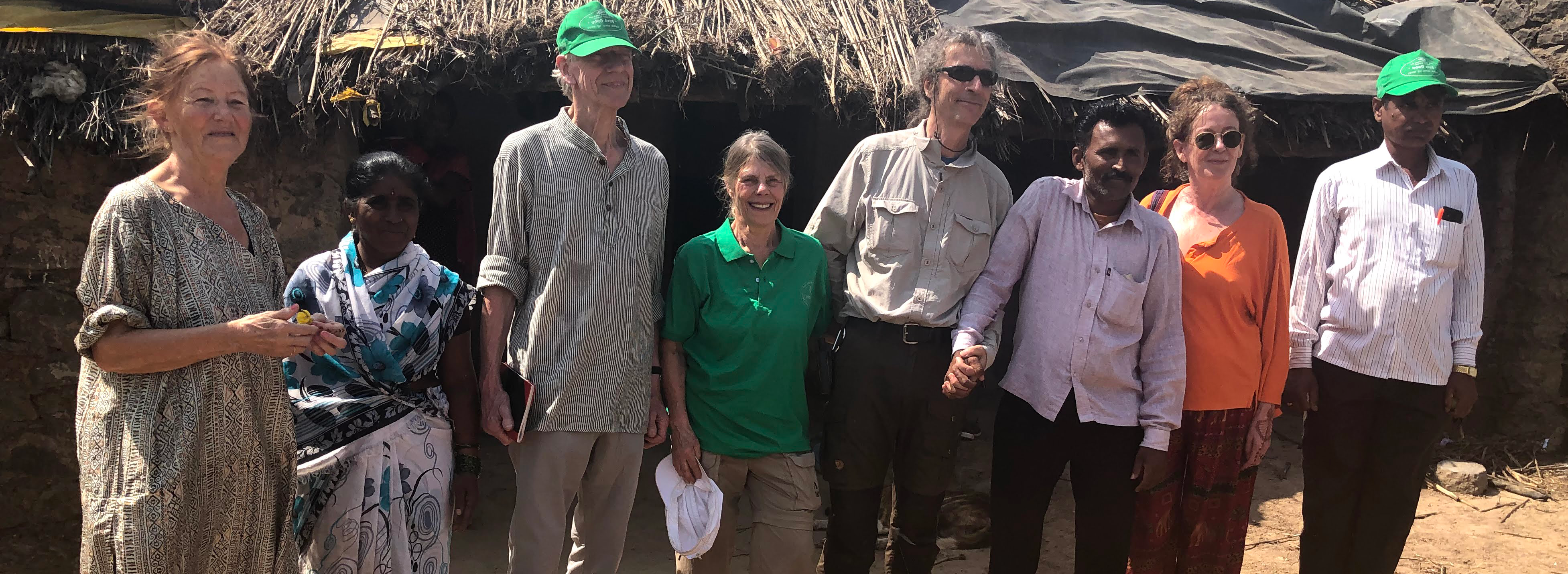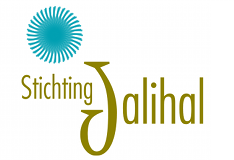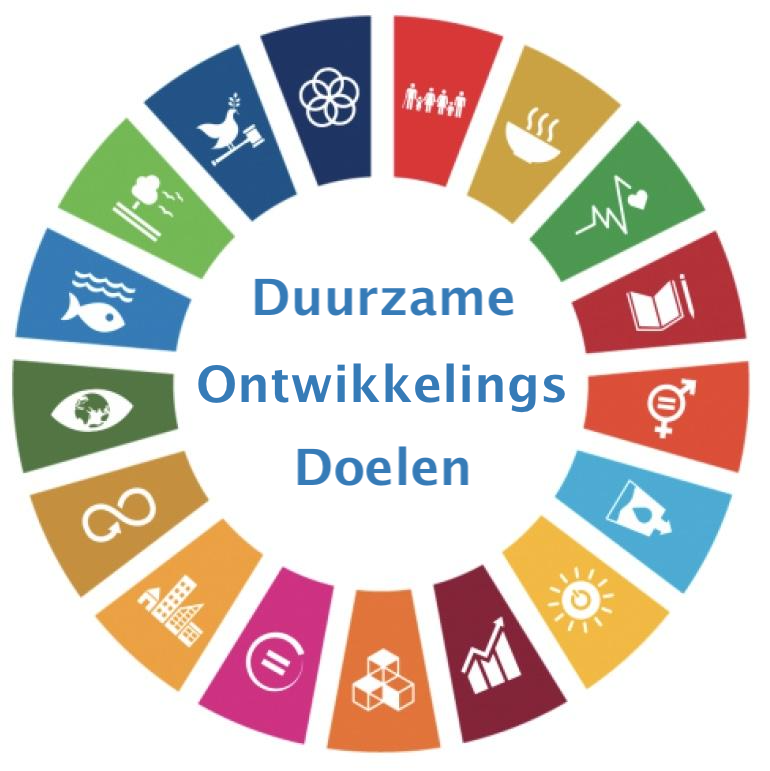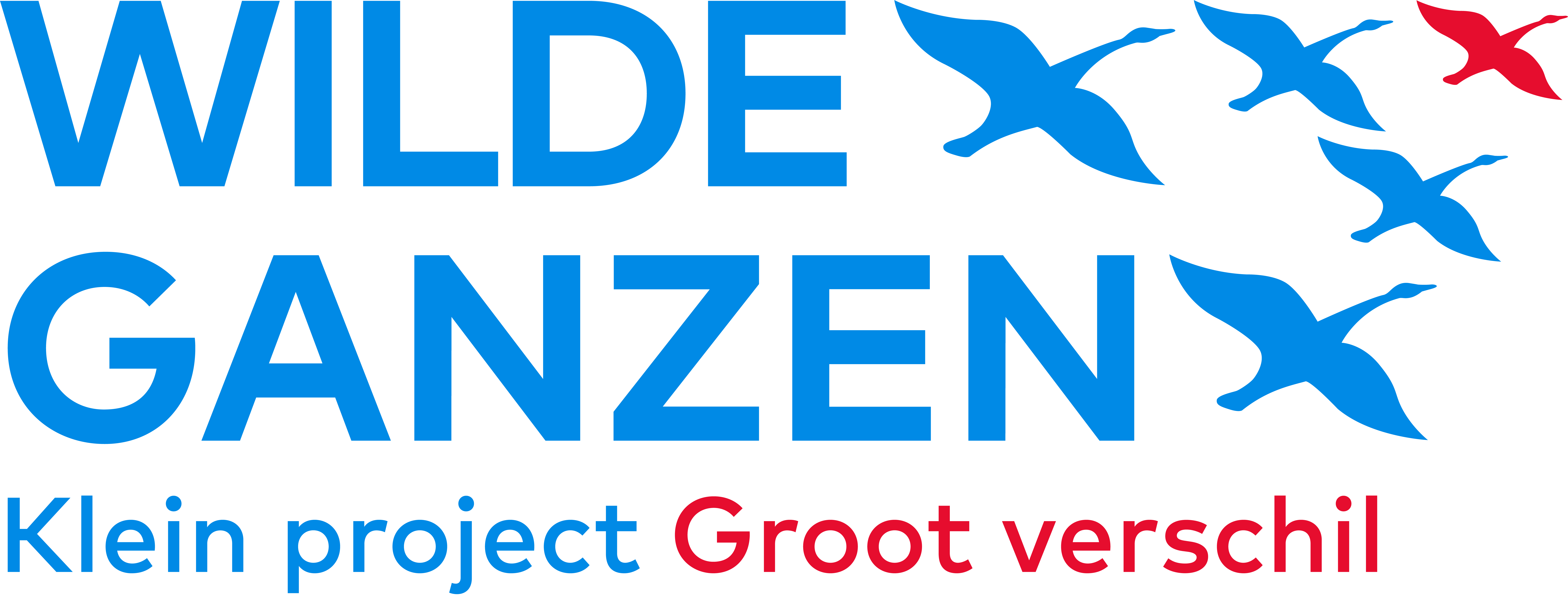Working visit of Dora and Huub Bosse 2020
Report of the working visit of Dora and Huub Bosse to YPS in Jalihal from 20 - 29 February 2020
Goals for this trip: Visiting already completed and current projects, maintaining contact with the staff of YPS and with the representatives of the 22 villages of our original work area. Rob Groters (image) and Rineke Aldenberg (sound) also travel with us. They are going to make a short film - pro bono - to portray the practice of the One Million Trees project. Anja Bourgondiën also travels with us. She is a graphic artist and works in education and is increasingly interested in the activities of Jalihal Foundation.
The sewing machine project (2005 – 2007)
 We visited some women who took part in this project which was carried out from 2005 to 2007. The photo shows Vjwala Jarir from Motewadi village. She has a studio in the much larger village of Sankh, on one of the busiest streets. She trains 3 women. There is always enough work for all four / three. 100 women have managed to earn an income from what the project has provided. Vjwala Jarir has developed into a real entrepreneur and thus offers opportunities to other women.
We visited some women who took part in this project which was carried out from 2005 to 2007. The photo shows Vjwala Jarir from Motewadi village. She has a studio in the much larger village of Sankh, on one of the busiest streets. She trains 3 women. There is always enough work for all four / three. 100 women have managed to earn an income from what the project has provided. Vjwala Jarir has developed into a real entrepreneur and thus offers opportunities to other women.
The goat projects (2007 – 2012)

 The 250 women who participated in one of the goat projects still have goats and thus achieve a better standard of living. We have visited Surabai Gherade in Khandnal. She is a widow and lives with her sister and brother-in-law because she is deaf. She has eight goats and a male goat. She very consistently crosses 2 breeds and produces good offspring. A kid of four months fares between 37.50 and 50 euros. She has her own bank account and she is doing really well: nevertheless within the involvement of the family and at the same time independent.
The 250 women who participated in one of the goat projects still have goats and thus achieve a better standard of living. We have visited Surabai Gherade in Khandnal. She is a widow and lives with her sister and brother-in-law because she is deaf. She has eight goats and a male goat. She very consistently crosses 2 breeds and produces good offspring. A kid of four months fares between 37.50 and 50 euros. She has her own bank account and she is doing really well: nevertheless within the involvement of the family and at the same time independent.
Shobba Birajadar, also from Khandnal, is a widow and has previously participated in the goat project. But now she works in the nursery department of a primary school. She has two sons who are both studying in Jath. She will soon get a house from House Project 2. Around that house there will be 30 trees and shrubs. She also has 4 more acres of uncultivated land around her house. She may become a candidate for the tree project in one of the following years.
The chicken project (2014 – 2018)

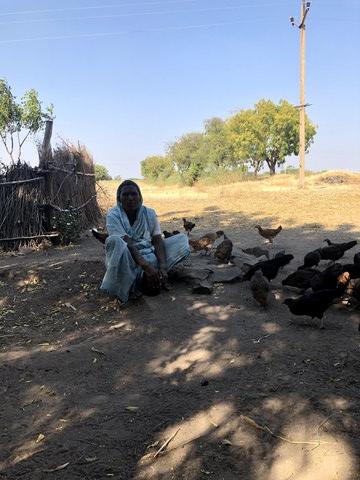 Laksmibai Sakunkhe participated in the chicken project. She has a nice flock of strong chickens, which she has hatched herself. She is a widow and lives with her father (her mother has recently passed away). Everything looks very neat, not a piece of plastic to be found, but a lot of flowers. She also has four buffaloes. There is nearly an acre of land around her father's house and she plans to plant more trees and shrubs on it in a while. She is very satisfied with her situation.
Laksmibai Sakunkhe participated in the chicken project. She has a nice flock of strong chickens, which she has hatched herself. She is a widow and lives with her father (her mother has recently passed away). Everything looks very neat, not a piece of plastic to be found, but a lot of flowers. She also has four buffaloes. There is nearly an acre of land around her father's house and she plans to plant more trees and shrubs on it in a while. She is very satisfied with her situation.
Janabai from Pandozani was also a participant in the chicken project. She now has 55 chickens of all ages and can sell 20 eggs a day. That yields 1.60 euros a day. Feeding costs are low because the chickens forage most of the food themselves. And then there is the income from the sale of roosters, because she also breeds her own chickens. She lives with her mother because she is very visually impaired.
The housing project (2017 – 2019)

 Kashibai Bhimrao from Jalihal is 55 years old and is a widow. Her son and daughter-in-law left with a quarrel. He went to cut sugar cane, far away. Kashibai now takes care of their 2 school-aged children, 5 and 7 years old. She has goats and a cow. She lived in a cabin but it was burned, now she lives in a tent with the grandchildren. One of the YPS staff members keeps an extra eye on her. This year she will get a house from House Project 2 so that she is rescued from her plight.
Kashibai Bhimrao from Jalihal is 55 years old and is a widow. Her son and daughter-in-law left with a quarrel. He went to cut sugar cane, far away. Kashibai now takes care of their 2 school-aged children, 5 and 7 years old. She has goats and a cow. She lived in a cabin but it was burned, now she lives in a tent with the grandchildren. One of the YPS staff members keeps an extra eye on her. This year she will get a house from House Project 2 so that she is rescued from her plight.
Malanabi Pirsab from Girgaon is single and has received a house from the Housing Project. Now she is participating, together with her older brother, in the 2018 tree project (pilot). They have installed irrigation themselves. Every day, between 7 am and 8 am, she waters the plantings. She has a 16-year-old son who is studying. Having her own home has given her the opportunity to shape her life independently. She can further develop herself with the tree project.
The trees project
Most of the attention on this trip has been devoted to the project: One Million Trees. We visited many participants who either took part in the pilot (2018) or the 2019 edition. During the pilot, 110 farmers each planted 200 trees and shrubs. In 2019, 950 farmers, 30 women and 20 local communities also planted 200 crops on their own land. Below we give a brief account of some of those visits.
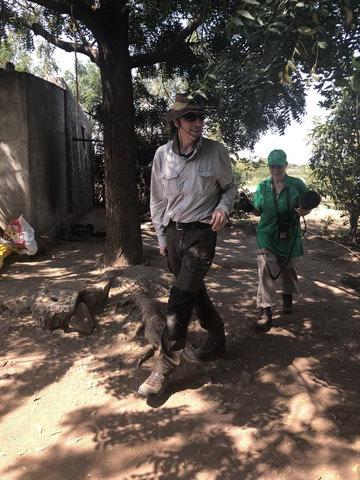 Rob and Rineke almost literally walk through all the hustle and bustle to see which images they can capture and what is needed. Sometimes that is fitting and measuring, sometimes we go in one direction and they (with another car and guidance because of the language) another. You can find the film (more than six minutes) on our website: https://www.jalihal.nl/bomenvideo
Rob and Rineke almost literally walk through all the hustle and bustle to see which images they can capture and what is needed. Sometimes that is fitting and measuring, sometimes we go in one direction and they (with another car and guidance because of the language) another. You can find the film (more than six minutes) on our website: https://www.jalihal.nl/bomenvideo
The film supplements this report as only images can. And they are beautiful!

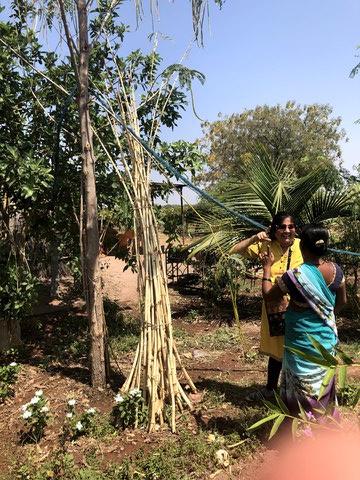 Narasappa Bhimanna from Kaladagi participated in the pilot. He is married and has two sons. He has won an award for taking such good care of his crops. The tapioca and sago root are also fantastic. A few cows and calves stand together to collect the manure that makes the soil more fertile. He grows fast-growing fruit and vegetables among the crops. He sells this “intercropping” on the market. Already 17 months after planting, he has sold bamboo sticks from his own plantings. We get freshly picked figs and tomatoes while we go through the planting with him.
Narasappa Bhimanna from Kaladagi participated in the pilot. He is married and has two sons. He has won an award for taking such good care of his crops. The tapioca and sago root are also fantastic. A few cows and calves stand together to collect the manure that makes the soil more fertile. He grows fast-growing fruit and vegetables among the crops. He sells this “intercropping” on the market. Already 17 months after planting, he has sold bamboo sticks from his own plantings. We get freshly picked figs and tomatoes while we go through the planting with him.
Pudalik Shinde from Motewadi and his wife work daily on the farm owned by him, along with his four brothers. From 2019 they will participate in the tree project: 200 crops per acre. This is a large farm on which they have also planted trees in-house. His brothers are helping during busy times. They also grow commercial crops such as corn, guava and henna. In addition to some water of their own, they now also have water from the Krishna River. They have not covered their water basin, but instead allow evaporation. The first figs can already be harvested in its “shade”, while in other places they are usually still small. Greater yield due to that evaporation, but others question that. The farm also has cows, calves, some buffaloes, goats, chickens and young chicks. A strong family and a strong company. They are also needed in a project like this. This is in line with the report of the Scientific Council for Government Policy (WRR): structural improvements in the development of a region arise from the middle layers of the population, not from the poorest circles.
 Medhedar Yellava Shankar, 45, has returned to her native region from Sangli after her husband's death. Her family did not support this: back to the countryside? Dry, hot and barren soil. She went anyway and started participating in the 2019 tree project. Her crops are looking good. She is eligible for more trees and shrubs because she has sufficient land available.
Medhedar Yellava Shankar, 45, has returned to her native region from Sangli after her husband's death. Her family did not support this: back to the countryside? Dry, hot and barren soil. She went anyway and started participating in the 2019 tree project. Her crops are looking good. She is eligible for more trees and shrubs because she has sufficient land available.
 We visit one of the local communities: a temple in Akkalwadi. The administrator, Shejale Laxman, is responsible here. Here the crops were planted in rows in September 2019. In between those rows, banks placed so that visitors will have shade within a few years. This temple is at the same time a meeting place for the villagers. It was very busy when we were there: it was new moon and that has a religious meaning, which is celebrated. A “holy man” is attached to the temple. He advises people who are in difficulty. Shejale lives in the temple yard with his wife and children. The crops look good. The soil is kept covered with weed litter (mulching). In this way, the soil becomes less hot and less water will suffice.
We visit one of the local communities: a temple in Akkalwadi. The administrator, Shejale Laxman, is responsible here. Here the crops were planted in rows in September 2019. In between those rows, banks placed so that visitors will have shade within a few years. This temple is at the same time a meeting place for the villagers. It was very busy when we were there: it was new moon and that has a religious meaning, which is celebrated. A “holy man” is attached to the temple. He advises people who are in difficulty. Shejale lives in the temple yard with his wife and children. The crops look good. The soil is kept covered with weed litter (mulching). In this way, the soil becomes less hot and less water will suffice.
 Rani Manohar is a young farmer who started the project in July 2019. He will get married in May 2020. He has a water pump and two more acres on which he grows drumsticks, mango, guava and pomegranates. Every three months he harvests vegetables by intercropping. A board member of YPS, Mukund, helps this farmer to expand his craftsmanship.
Rani Manohar is a young farmer who started the project in July 2019. He will get married in May 2020. He has a water pump and two more acres on which he grows drumsticks, mango, guava and pomegranates. Every three months he harvests vegetables by intercropping. A board member of YPS, Mukund, helps this farmer to expand his craftsmanship.
 Sangappa Pujari and his wife from Khandanal have been participating since the pilot in 2018. They lived in a hut that was lost in a fire. They have received an emergency home from YPS. They have planted 200 trees and shrubs on their 1.5 acre land. With intercropping they have a healthier daily menu and what is left they sell on the market. They are now building a new house together with family and neighbors. The yard and the crops: it all looks well cared for. In 2013 this family received emergency aid (rice and beans).
Sangappa Pujari and his wife from Khandanal have been participating since the pilot in 2018. They lived in a hut that was lost in a fire. They have received an emergency home from YPS. They have planted 200 trees and shrubs on their 1.5 acre land. With intercropping they have a healthier daily menu and what is left they sell on the market. They are now building a new house together with family and neighbors. The yard and the crops: it all looks well cared for. In 2013 this family received emergency aid (rice and beans).
 Pralhad Gaudappa, a single woman in Khandanal, joined the tree project in August 2019 with the help of her older brother. Together they have installed irrigation. They are both amazed that so much can grow in soil that has always been fallow. They are already harvesting peppers and roses. Roses are used in temples. There is also an acre of aubergines, the seeds of which they will sell. In June, after the first rain, they will plant more trees and shrubs themselves.
Pralhad Gaudappa, a single woman in Khandanal, joined the tree project in August 2019 with the help of her older brother. Together they have installed irrigation. They are both amazed that so much can grow in soil that has always been fallow. They are already harvesting peppers and roses. Roses are used in temples. There is also an acre of aubergines, the seeds of which they will sell. In June, after the first rain, they will plant more trees and shrubs themselves.
Widows
You will encounter a remarkable number of widows in our descriptions. Where sons continue to live at home after their marriage, daughters move to the spouse's family immediately after marriage. In addition, daughters are expected to contribute a dowry to their marriage. A cheap dowry often means a cheap husband. This could mean a spouse with a disability, or someone who has a blank spot in his CV or someone decades older. Domestic violence and addiction are also above average. Many women return to their families after incidents, but in many cases do not find a warm welcome there. A second marriage is not in line with existing views. What remains in the opinion of many is a mouth to feed. In fact, these women have no perspective. They only get a second chance if it is offered from outside. If widows can maintain themselves independently, they will be included in society again. That is why YPS and therefore we also devote a lot of attention and effort to widows and you will often encounter them in our stories. By the way: YPS has succeeded in recent years to allow 12 women to enter into a new marriage by influencing public opinion in the villages and by advising on the choice of a new partner. In these cases, the family and fellow villagers also found it acceptable.
So far report of the visits we have made. In fact, all visits are more than worth mentioning. It can be deduced from the impressions above that there are participants who, with the help of this project, can gain new perspective. But we are now also dealing with farmers who do not need this project. However, they do play an important role in the project. The participants who can barely maintain themselves feel included in the big picture. They are addressed by the staff of YPS as farmers (and not as poor people). In this way they themselves climb out of their plight. Moreover, it appears that the participants who are better situated are helpful to the others. This also means that there will be more contacts and that it will be easier for people to participate in the project in the coming years. The appreciation for the women of our original target group who participate in this project is also increasing across the board.
 Anja Bourgondiën travels with us. She photographs at all locations that we visit. We also visit the school and she agrees with the school management that she will teach an afternoon in drawing and painting, in which different techniques will be discussed. It was a great success and ended in a second session.
Anja Bourgondiën travels with us. She photographs at all locations that we visit. We also visit the school and she agrees with the school management that she will teach an afternoon in drawing and painting, in which different techniques will be discussed. It was a great success and ended in a second session.
Others consults
“The women's guild”
 In each of the 22 villages, a few women have been chosen to represent the interests of all women in the villages. These women meet on the campus in Jalihal on average once a month. They then look at the developments that are going on. They also inform YPS if any particularities arise and they represent the interests of those women who need it. During this trip we also had a meeting with a delegation of these women. They feel that the situation has changed so much in recent years that they are going to change their functioning. Nowadays almost everyone has a telephone and there is a lot of influence from children who are now studying. The women assume that the younger generation will soon take over their duties. There are two explicit wishes. Firstly, the women want there to be a space in every village where they can meet without having to keep coming to Jalihal. In many cases they are then dependent on their husband or family for transport. That takes too much time from all those different villages. Secondly, the women want to receive additional training so that they can play a guiding role in the One Million Trees project. This will be further elaborated.
In each of the 22 villages, a few women have been chosen to represent the interests of all women in the villages. These women meet on the campus in Jalihal on average once a month. They then look at the developments that are going on. They also inform YPS if any particularities arise and they represent the interests of those women who need it. During this trip we also had a meeting with a delegation of these women. They feel that the situation has changed so much in recent years that they are going to change their functioning. Nowadays almost everyone has a telephone and there is a lot of influence from children who are now studying. The women assume that the younger generation will soon take over their duties. There are two explicit wishes. Firstly, the women want there to be a space in every village where they can meet without having to keep coming to Jalihal. In many cases they are then dependent on their husband or family for transport. That takes too much time from all those different villages. Secondly, the women want to receive additional training so that they can play a guiding role in the One Million Trees project. This will be further elaborated.
The suppliers
 We are going to one of the 7 nurseries that supply crops to YPS for One Million Trees. It is a state-owned company that works organically. The company covers 2,000 acres (800 hectares). A small proportion of them work with 10 permanent employees. The rest of the land is extensively planted with trees. They supply many young trees to the government for planting along roads. Their prices are based on self-collection. YPS engages transport companies several times a year. The crops from this nursery are at least 60 cm high on delivery. Important varieties from here include tamarind, mango, guava, lemon and custard apple trees.
We are going to one of the 7 nurseries that supply crops to YPS for One Million Trees. It is a state-owned company that works organically. The company covers 2,000 acres (800 hectares). A small proportion of them work with 10 permanent employees. The rest of the land is extensively planted with trees. They supply many young trees to the government for planting along roads. Their prices are based on self-collection. YPS engages transport companies several times a year. The crops from this nursery are at least 60 cm high on delivery. Important varieties from here include tamarind, mango, guava, lemon and custard apple trees.
The experimental farm
 The YPS experimental farm plays an important role in the whole. Some crops are fully grown there. In addition, all products are collected from the external nurseries and brought to the farm. There they are stored, intensively cared for and sufficiently watered. A pipeline has been constructed that supplies water from a lake in the area for more than 5 km. transports to the farm's basin. All logistics are arranged from here. Everything is done in three routes of more than 300 participants. The products are put together for each participant. Each truck can transport approximately 6 to 8 deliveries at the same time, which are therefore carefully separated from each other during loading. Usually four or five transport companies are in operation at the same time. The crops must now be distributed to 37 villages, instead of the original 22 villages. So there are many applications for participation from the area. YPS had only expected that after three or four years. A good sign.
The YPS experimental farm plays an important role in the whole. Some crops are fully grown there. In addition, all products are collected from the external nurseries and brought to the farm. There they are stored, intensively cared for and sufficiently watered. A pipeline has been constructed that supplies water from a lake in the area for more than 5 km. transports to the farm's basin. All logistics are arranged from here. Everything is done in three routes of more than 300 participants. The products are put together for each participant. Each truck can transport approximately 6 to 8 deliveries at the same time, which are therefore carefully separated from each other during loading. Usually four or five transport companies are in operation at the same time. The crops must now be distributed to 37 villages, instead of the original 22 villages. So there are many applications for participation from the area. YPS had only expected that after three or four years. A good sign.
The staff
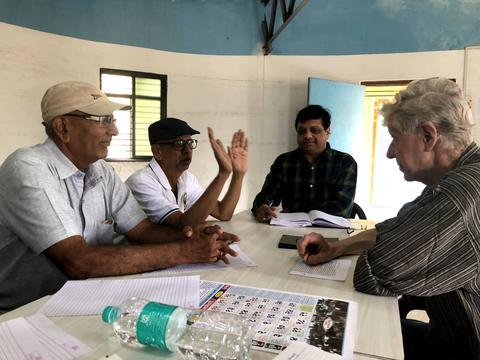
 Consultation with the staff and with the doctors makes it clear to us that everyone is delighted with the project. The doctors in particular speak out clearly: “We don't actually see any weaknesses in this project. We think it will write history and find a lot of imitation ”. Discussions are therefore about possible options for further rolling out the project. We agree that each of us will think about it and come back to it later. The scientific contributions made by the doctors are of great importance. For example, it appears that the absorber initially offered contained soil polluting components. Fortunately, another supplier was found in time who delivers this product. In addition, it is all employees together who form a strong team. In a meeting with the 20 field workers, we were able to experience that everyone is motivated to fulfill their position.
Consultation with the staff and with the doctors makes it clear to us that everyone is delighted with the project. The doctors in particular speak out clearly: “We don't actually see any weaknesses in this project. We think it will write history and find a lot of imitation ”. Discussions are therefore about possible options for further rolling out the project. We agree that each of us will think about it and come back to it later. The scientific contributions made by the doctors are of great importance. For example, it appears that the absorber initially offered contained soil polluting components. Fortunately, another supplier was found in time who delivers this product. In addition, it is all employees together who form a strong team. In a meeting with the 20 field workers, we were able to experience that everyone is motivated to fulfill their position.
Water from the river
 The Krishna River has its source in the home state of Maharashtra and then passes through the adjacent state of Karnataka for about 16 miles south of Jalihal. YPS has argued for years to get water from this river, and always without success. But in 2019 it worked! In partial deliveries, 56 million m3 of water was pumped to a basin and from there, via a concrete channel and natural height differences, entered the Jalihal region. Whether that will happen in 2020 and beyond is still the question. We will find out soon.
The Krishna River has its source in the home state of Maharashtra and then passes through the adjacent state of Karnataka for about 16 miles south of Jalihal. YPS has argued for years to get water from this river, and always without success. But in 2019 it worked! In partial deliveries, 56 million m3 of water was pumped to a basin and from there, via a concrete channel and natural height differences, entered the Jalihal region. Whether that will happen in 2020 and beyond is still the question. We will find out soon.
Infrastructure
We have been amazed and pleased with the improvement of roads since our visit in 2017. It has been decided from New Delhi that roads will be built that will connect major cities more quickly. From Sangli, where the YPS headquarters are located, it becomes easier to reach the Jalihal region. Electricity is also becoming available to more and more villages. These developments certainly offer opportunities for further progress.
Finally
In retrospect, it becomes clear to us that we traveled back just in time to avoid being delayed by the corona crisis. It is important to mention here that the project will not be delayed due to the corona measures. There is a lot of space and little corona in the Jalihal region. The controls are meticulous, quarantine is available and the measures are taken seriously by the population.
We are impressed by the progress made in the region during the recent years.
- Economic activity has visibly increased.
- The expansion of the YPS staff, with more field workers and administrative guidance.
- The condition of the crops that already provide significant shade.
- The “intercropping”: vegetables and herbs that are planted around the trees and increase the income of the participants within months. That was not foreseen so quickly.
- The positive atmosphere between the participants themselves, the cooperation between women and men, the increased tidiness around the house and yard.
It is clear that this project is bringing new energy to the Jalihal region.
A delighted greeting, also on behalf of the staff of YPS and of course also on behalf of our board,
Dora and Huub Bosse
July 2020
